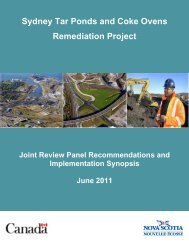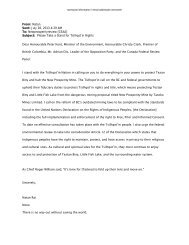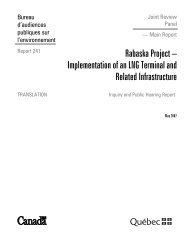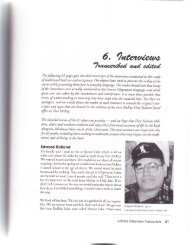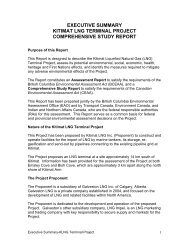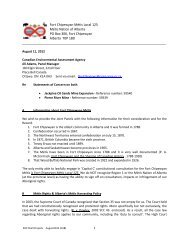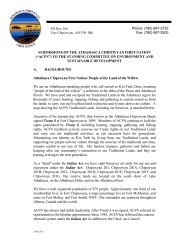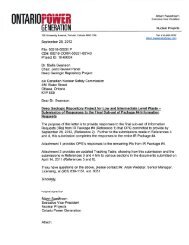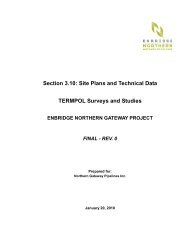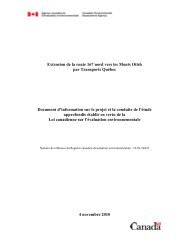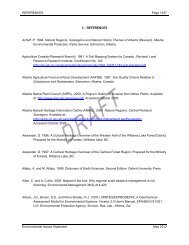From: on behalf of Panel Registry Subject: FW: TNG registration of ...
From: on behalf of Panel Registry Subject: FW: TNG registration of ...
From: on behalf of Panel Registry Subject: FW: TNG registration of ...
You also want an ePaper? Increase the reach of your titles
YUMPU automatically turns print PDFs into web optimized ePapers that Google loves.
Past climate changes and their impacts <strong>on</strong> fish to date<br />
Globally, trends provided by scientists show fish stocks in dramatic decline. According to the IPCC,<br />
evidence for impacts <strong>of</strong> recent climate change being a serious factor in this decline is rapidly<br />
accumulating. In their 2007 4 th Assessment, the <strong>Panel</strong> summarizes the state <strong>of</strong> salm<strong>on</strong>ids <strong>on</strong> the<br />
west coast. The report stated that "Cold and coolwater fisheries, especially salm<strong>on</strong>ids, have been<br />
declining as warmer/drier c<strong>on</strong>diti<strong>on</strong>s reduce their habitat. The searun salm<strong>on</strong> stocks are in steep<br />
decline throughout much <strong>of</strong> North America. Pacific salm<strong>on</strong> have been appearing in Arctic rivers.<br />
Salm<strong>on</strong>id species have been affected by warming in U.S. streams." 61<br />
Closer to home, climate change is believed to have been affecting the fishery resource in the XGCA<br />
for some time. While the Fraser River remains <strong>on</strong>e <strong>of</strong> the most productive Pacific salm<strong>on</strong> rivers in<br />
the world, overall trends are not positive, and climate change is likely to make things worse. A<br />
recent University <strong>of</strong> British Columbia (UBC) study analyzed the relati<strong>on</strong>ship between stream<br />
temperature and salm<strong>on</strong> survival. Their findings show that temperature challenges aerobic activity<br />
in salm<strong>on</strong> and that each stock <strong>of</strong> salm<strong>on</strong> may have different thresholds <strong>of</strong> survival. 62 According to<br />
T<strong>on</strong>y Farrell, UBC, "This study shows that an increase over the past 50 years <strong>of</strong> 1.8 degrees Celsius in<br />
the Fraser River's peak summer temperatures is too much too fast for some salm<strong>on</strong> stocks". He goes <strong>on</strong><br />
to<br />
say "It also shows that climate change affects even the same species differently because individual<br />
populati<strong>on</strong>s may have adapted to their respective envir<strong>on</strong>ments. 63<br />
The following three Fgures (13, 14 and 16) from their 2009 report highlight the declines in sockeye,<br />
Coho and Chinook salm<strong>on</strong> for the Fraser River, into which the Taseko and Chilko Rivers flow. Aside<br />
from the Upper Fraser summer Chinook run, all other species and runs are also in jeopardy, which<br />
will<br />
<strong>on</strong>ly be further compounded by climate change and its effects <strong>on</strong> fish and fish habitat located<br />
within the XGCA.<br />
The above development is very alarming to the Xeni Gwet’in community, given that especially<br />
Sockeye salm<strong>on</strong> are the most important fish species for their c<strong>on</strong>sumpti<strong>on</strong>. The 2009 sockeye<br />
escapement into many tributaries <strong>of</strong> the Fraser River including the Chilko was far below<br />
expectati<strong>on</strong>s. The preliminary indicati<strong>on</strong>s suggest that the sockeye fry from the Chilko River brood<br />
year<br />
left the Chilko system in record numbers and size and expectati<strong>on</strong>s ran high in 2009 as a result<br />
<strong>of</strong> this, but the return rate was c<strong>on</strong>sidered a collapse.<br />
The situati<strong>on</strong> remains <strong>of</strong> great c<strong>on</strong>cern nati<strong>on</strong>ally and a judicial inquiry has been scheduled by the<br />
Canadian government to determine the cause <strong>of</strong> the sockeye collapse in the Fraser River. Early<br />
indicati<strong>on</strong>s suggest climate change may be to blame. Scientists are now suggesting that ocean<br />
c<strong>on</strong>diti<strong>on</strong>s<br />
in 2007 played a large role in this issue with warmer water temperatures and a lack <strong>of</strong><br />
food<br />
that the young sockeye are reliant <strong>on</strong> during their early m<strong>on</strong>ths in the ocean.<br />
61 (In the North America Chapter <strong>of</strong> the IPCC's WGII Technical Report: "Climate Change 2007: Impacts,<br />
IPCC, 2007<br />
Adaptati<strong>on</strong> and Vulnerability" issued April.)<br />
62 UBC (2008)<br />
63 T<strong>on</strong>y Farrell, UBC Faculty <strong>of</strong> Science website<br />
46



